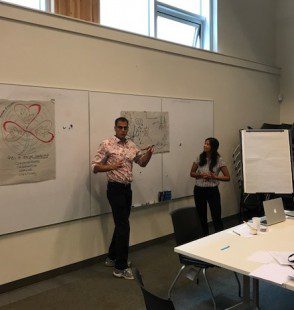There is a new discourse emerging within the education and learning for sustainability community, which argues that citizens need to have certain key competencies that allow them to engage constructively and responsibly with an increasingly complex and unsustainable world. As one recent authorative UNESCO report suggests;
”competencies describe the specific attributes individuals need for action and self-organization in various complex contexts and situations. They include cognitive, affective, volitional and motivational elements; hence they are interplay of knowledge, capacities and skills, motives and affective dispositions. Competencies cannot be taught, but have to be developed by the learners themselves. They are acquired during action, on the basis of experience and reflection (UNESCO, 2015; Weinert, 2001)”.
So on the 28 June I attended a couple of events at the University of Plymouth’s Vice Chancellors Teaching and Learning conference entitled: “Sustainability Education through games and simulation. It’s catching! Developing competency-based approaches to sustainability education.”
This was accurately described as an immersive training opportunity to explore Sustainability Education through the use of simulations and games as an active and participatory teaching and learning approach. Led by Prof Harold Glasser from Western Michigan University, this workshop introduced Catch© a simulation game that enables students to explore individual and collective management of a renewable natural resource such as fish. This face-to-face systems dynamic simulation game has been developed by a multi-disciplinary team and uses two ostensibly conflicting goals to explore the possibility of eliciting common pool resource management and decision-making.
The game has two systems goals: (1) Catch as many fish as you can and (2) Leave the fishery in the state you found it. The game utilises a common pool resource setting, using realistic resource issues, like numbers of fishing boats; infrastructure and severe weather conditions, all of which make decision making unpredictable and indeterminate … . It was great fun, and taken seriously by all of the 30 or so academics who participated. So seriously that the 6 or so teams saw it initially as a game to compete and win! Even academics it seems are driven by the urge to make capitalism work for them! Only towards the end of the game did we all realise that had we cooperated earlier then collectively we might have made a much more sustainable fist of the fishing we undertook as operators. And, which of the core competencies did we exhibit? Not many in my view-especially the collaborative competence. Arnim Wiek at Arizona State University has defined and operationalised five core sustainability competences:
- System thinking
- Futures thinking or anticipatory
- Values thinking or normative
- Strategic thinking or action- orientated
- Collaborative or inter personal
The game provided a valuable insight into how an innovative, core-competency based approach to meeting the UN Sustainable Development Goals might contribute to a deeper and more meaningful way of approaching some of the wicked problems which underpin humanities collective, unsustainable behaviour.
